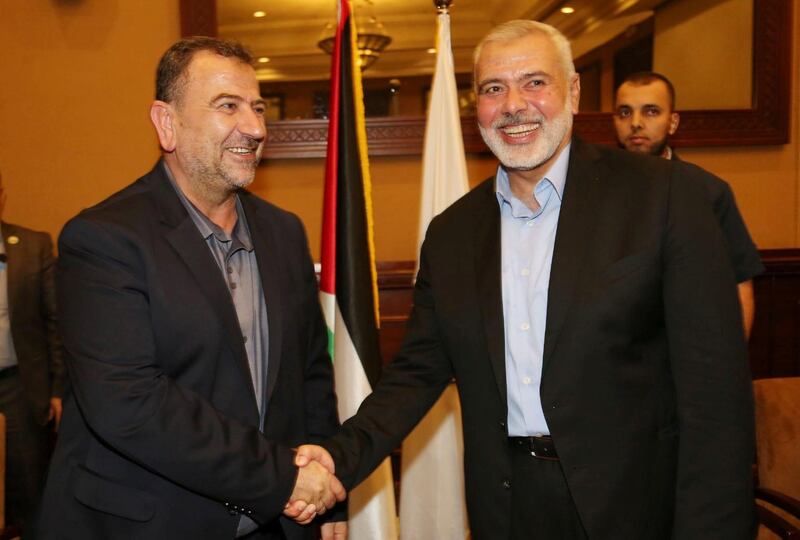Exiled Hamas leaders have returned to the Gaza Strip for talks on whether to end four months of conflict with Israel and accept a ceasefire proposed by mediators from Egypt and the United Nations.
Salah Al Arouri, the Turkey-based deputy head of the group that rules Gaza, and Mussa Abu Marzuk, another senior leader, crossed from Egypt into Gaza for three days of talks with other Hamas leaders, said Hamas spokesman Fawzi Barhoum.
Hamas is considered a terrorist organisation by Israel, the US and European Union, while Mr Al Arouri is a founder of the Hamas military wing and is wanted by Israel.
The Hamas website Safa said on Friday that this marked the first time all members of the political bureau have gathered in Gaza.
Hamas officials have said guarantees were given that the delegation, which arrived late on Thursday, would not be targeted by Israel and that progress has been made toward a truce that could pave the way for a UN-led reconstruction of Gaza.
The arrival of the Hamas leadership follows a flurry of diplomatic activity aimed at curtailing the violence between Palestinians in Gaza and Israel, while also trying to end the 11-year-old schism between Hamas and the West Bank-based Palestinian Authority.
Nickolay Mladenov, the UN special co-ordinator for Middle East peace efforts, has over the past two weeks been shuttling among Cairo, Jerusalem, Ramallah and Gaza to sell the ceasefire. Palestinian Authority President Mahmoud Abbas sent Deputy Prime Minister Ziad Abu Amr to Gaza for the talks.
_______________
Read more:
Israel reimposes blockade of fuel deliveries to Gaza
Labour apology for Hamas gaffe fails to quell row
Seaborne activists challenge Israel's Gaza blockade
_______________
Mr Barhoum said the aim of the delegation's visit was “to achieve an internal reconciliation and end the unfair Israeli siege that has been imposed on the Gaza Strip for 12 years”.
Gaza, a tiny coastal strip of land that is home to two million Palestinians, has been the scene of air-raids, firefights and missile battles since the end of March when residents started weekly protest marches to the fence separating them from Israel.
More than 150 Palestinians have been killed since then, most of them shot by Israeli soldiers. Gunmen from Gaza have occasionally fired on Israeli forces too, killing a soldier two weeks ago, while others have launched rockets into Israeli towns and sent incendiary kites and balloons across the border, setting fire to farmland.
While Israel and Hamas say they do not talk directly, speculation that a deal is in the works was heightened on Thursday when Prime Minister Benjamin Netanyahu abruptly cancelled a visit to Colombia planned for next week. Mr Netanyahu’s security cabinet will meet on Sunday to discuss the ceasefire efforts, Israel’s Channel 10 reported.
In another move that prompted talk of progress, Israel approved the entry into Gaza of six truck-loads of equipment for water projects carried out by the US government agency, USAid. Defence Minister Avigdor Lieberman, however, on Thursday blocked fuel and gas deliveries to Gaza over the continued launch of incendiary devices towards Israel.
Israel has been seeking the release of two citizens held in Gaza and the bodies of two soldiers killed in a 2014 war with Hamas. Israel had to free more than 1,000 Palestinian prisoners in 2011 to secure the release of a single soldier held prisoner by Hamas for five years, but opposition to another such transaction has grown among the public and politicians, who say it gives Hamas an incentive to kidnap Israelis.
Mr Netanyahu’s deputy minister for public diplomacy, Michael Oren, acknowledged that efforts were being made to halt the violence, without discussing Israel’s involvement.
“We always communicate through third parties,” he said. “There’s no viable solution for Gaza that does not involve Egypt.”





